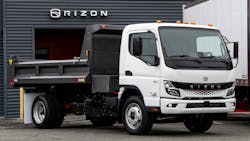Vancouver Island deploys first municipal electric Rizon truck
Key takeaways:
- The City of Colwood is the first municipality on Vancouver Island to deploy a Rizon all-electric truck.
- The city is integrating the e16M model into its municipal operations.
- The delivery highlights growing municipal demand for zero-emission equipment amid Canada’s push toward net-zero emissions.
Colwood became the first municipality on Vancouver Island, British Columbia, to deploy a Rizon electric truck. The city is integrating an e16M model, a Class 4 medium-duty truck upfitted with a dump body, to support its municipal wellness and public works services.
The delivery caps a busy month for Rizon, which also completed handovers in Vancouver and Quebec.
“Colwood’s adoption of a Rizon truck is a great example of how local governments can lead the charge toward zero-emission transportation,” Andreas Deuschle, global head of Rizon Truck, said. “We are proud to support municipalities like Colwood as they take real action to build healthier, more sustainable communities through innovative fleet choices.”
See also: CARB states are getting cold feet, delaying ACT
Rizon is Daimler Truck’s ninth and newest brand. Daimler announced the brand in May 2023 and launched it in Canada in 2024. The Canadian government has established an incentive program to encourage fleets to electrify, prompting companies and municipalities to explore sustainable fleet options for improved environmental performance and operational efficiency.
Rizon said its trucks qualify for the Canadian government’s Incentives for Medium- and Heavy-Duty-Zero-Emission-Vehicles program, which has been in effect since 2022. A Rizon truck could qualify for roughly $75,000 at the point of sale under this program, and could be eligible for additional provincial incentives of up to $75,000 in B.C.
Rizon’s trucks at a glance
Rizon said its Class 4-5 medium-duty battery-electric vehicles will range from 15,995 to 18,850 lb. in gross vehicle weight for Canadian customers and, depending on the battery configuration, can run up to 177 km (110 miles) or up to 257 km (160 miles) on a single charge at 50% payload.
The trucks are capable of being charged by two types of battery charging systems: DC Fast Charging (via CCS1 connector), and less expensive Level 2 AC Charging (via J1772 connector).
About the Author
Jeremy Wolfe
Editor
Editor Jeremy Wolfe joined the FleetOwner team in February 2024. He graduated from the University of Wisconsin-Stevens Point with majors in English and Philosophy. He previously served as Editor for Endeavor Business Media's Water Group publications.

